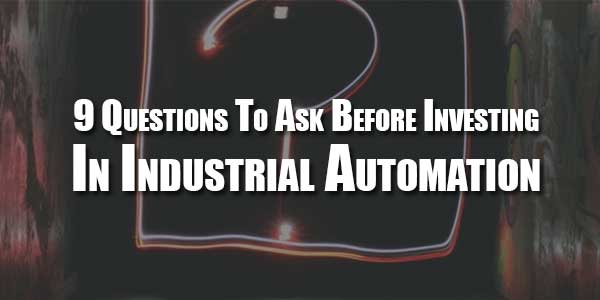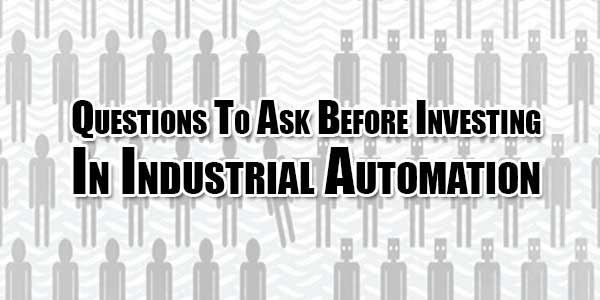
Investing in industrial automation is no trivial undertaking. It will usually entail a large capital investment, and when mistakes are made allocating large capital investments, well, we all know how that story ends. Not happily.
So you want to minimize the risk when you are looking at employing industrial automation in your company’s production facilities. Prior planning is key, as is asking the right questions, both of your own organization and of any vendors that will be involved in the enterprise. Failure to address many important points prior to enacting your plan will almost certainly lead to its failure.
Here are some questions that we feel are pertinent when you are considering the investment in industrial automation.
Table of Contents
Internal Organizational Questions:
1.) What Is The Goal Of The Automation?
This is the most basic question and if it cannot be answered in a definitive manner, then perhaps automation is not what your company needs. There should be a specific problem or issue that industrial automation can resolve for your operation.
The answer to this question needs to come from those with a deep understanding of your production facilities and processes. Specific steps for improvement, rather than generalities, will lead to more informed questions when delving into the details later with vendors and implementers. Enhancements that can gain your company a competitive edge should certainly be discussed.
2.) Is There A Viable Budget And Timetable?
This can be an important issue in some corporate cultures and needs to be transparent from the start of the project. Realistic projections of expenditures must be made with matching funding being made available at the corporate level.
A related factor is the timetable in which your company intends to build and implement the automation project. Practical expectations need to be built into your projections and allowances for time and cost overruns and their impact on your business need to be considered.
3.) Do We Have Internal Expertise?
You need to be ruthlessly honest with this question and be prepared to go out of house for the required skills to develop and implement your automation vision. This will be a complex and expensive task that needs to be done with a minimum of on the job training. Integrating your current team with some outside expert help is one way to go. Another alternative is to simply manage the project and rely on your vendors for implementation and support.
4.) Will Automation Enhance Productivity And Add Business Value?
According to www.wipro.com, these related questions are extremely important for company executives to consider. Pondered from the level of CIO, the answers will determine if process automation is the right way for your organization to go. If no value is added then why expend the financial resources?
These questions drive to the heart of all the internal discussions that your organization’s leaders should be having prior to investing a dime in automation. The goal is to determine if automation will be beneficial to your business. If it is, then you can tackle the problem of how to get it done.

5.) How Experienced/Established Are Your Vendors?
Are you dealing with an established manufacturer of electronic components coupled with an experienced automation software company? You don’t want to stake your company’s success or failure on a new startup that has no track record. You want to be able to look at successful implementations in industries that have similar issues as yours.
On the hardware side, an established company is more likely to remain in business and support their products into the future. Similarly with your software, you will want to be as certain as possible that future upgrades, features, and security patches will be handled by the team that created the package.
6.) Is The Operating System Open Or Closed?
According to www.sdcexec.com, the answer to this question can have long-lasting ramifications. Closed systems present limitations on future enhancements and often have to be maintained specifically by the original vendor. Lack of future support can be a risk in this situation. Open systems do not have these limitations and are the preferred method for implementing new industrial automation systems.
7. )How Portable Is The Data Generated By The System?
Data is at the core of automated industrial systems. The ability to collect and analyze data in multiple formats and across various platforms can make the difference in a system that is workable and a system that truly adds value to your enterprise.
Software vendors offering industrial automation solutions need to make it possible for you to use your data to its maximum potential by making it portable to any platform and format that you need.
8.) Can The Vendor Meet Your Budgetary And Time Constraints?
Just as it is important to work out these factors before embarking on an automation project, it is equally important to feel confident in your vendor’s ability to achieve your goals. Can they point to previous engagements and customers whose requirements were met?
Though unforeseen circumstances can always occur, you want serious assurances that your vendor understands your expectations and will do everything in their power to meet them. Anything less should send you in search of another vendor.
9.) How Secure Will My System Be?
This crucial question may well determine your choice of vendor. Security is paramount in today’s information landscape, and your industrial automation system is no different. You must be confident in your vendor’s approach to security and in their commitment to support emerging security issues in the future.
You Must Have Some Questions Of Your Own!
The questions we have listed above are meant to be a starting place for your investigation into industrial automation and its place in your business. You should keep these basic questions in mind as you approach this thorny corporate endeavor. The fact that many industrial automation projects fail to show tangible results is often the result of a poorly thought out approach and ignoring the important questions that need to be answered before setting out on this complex path.
Was this article helpful and informative? Leave us a comment with your thoughts in the section below.














Really great post. Now i learn new things in the social media opportunity to growing business. Thanks for this article.
Welcome here and thanks for reading our article and sharing your view.